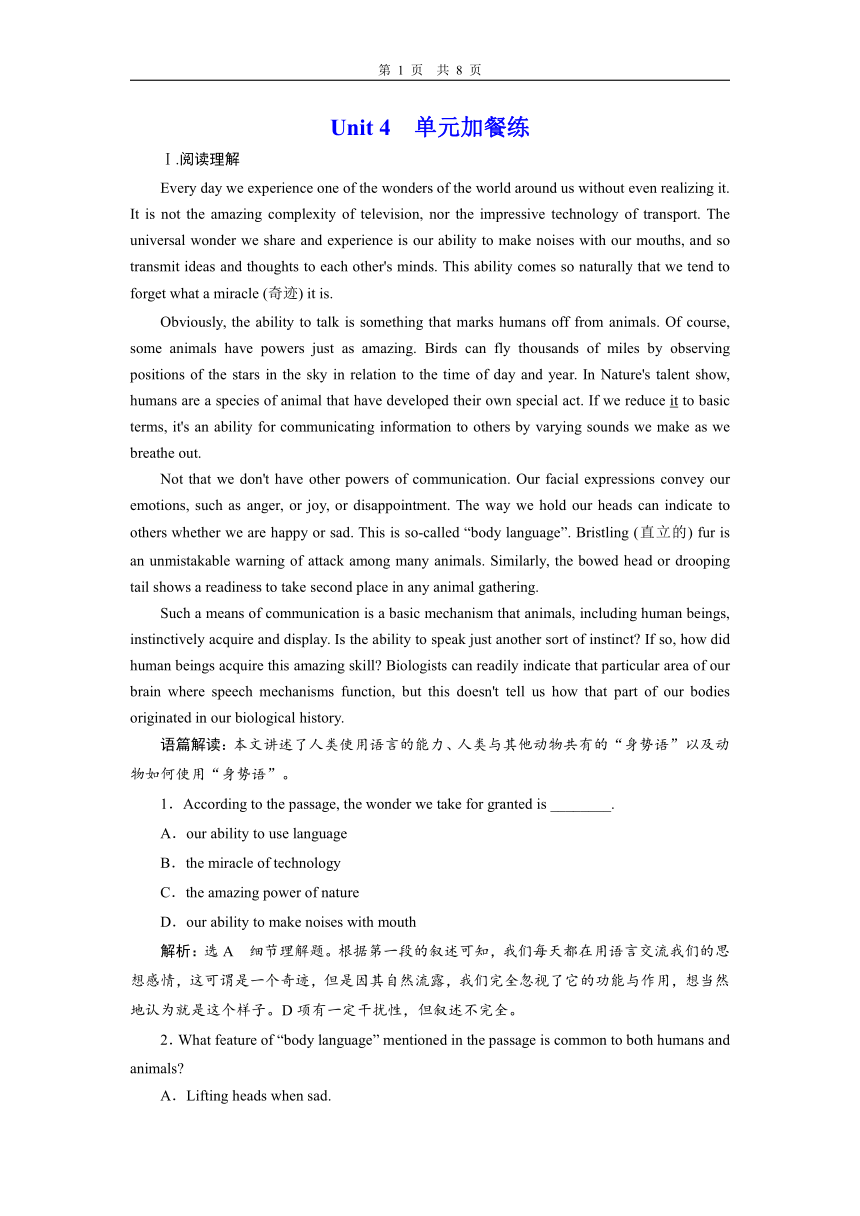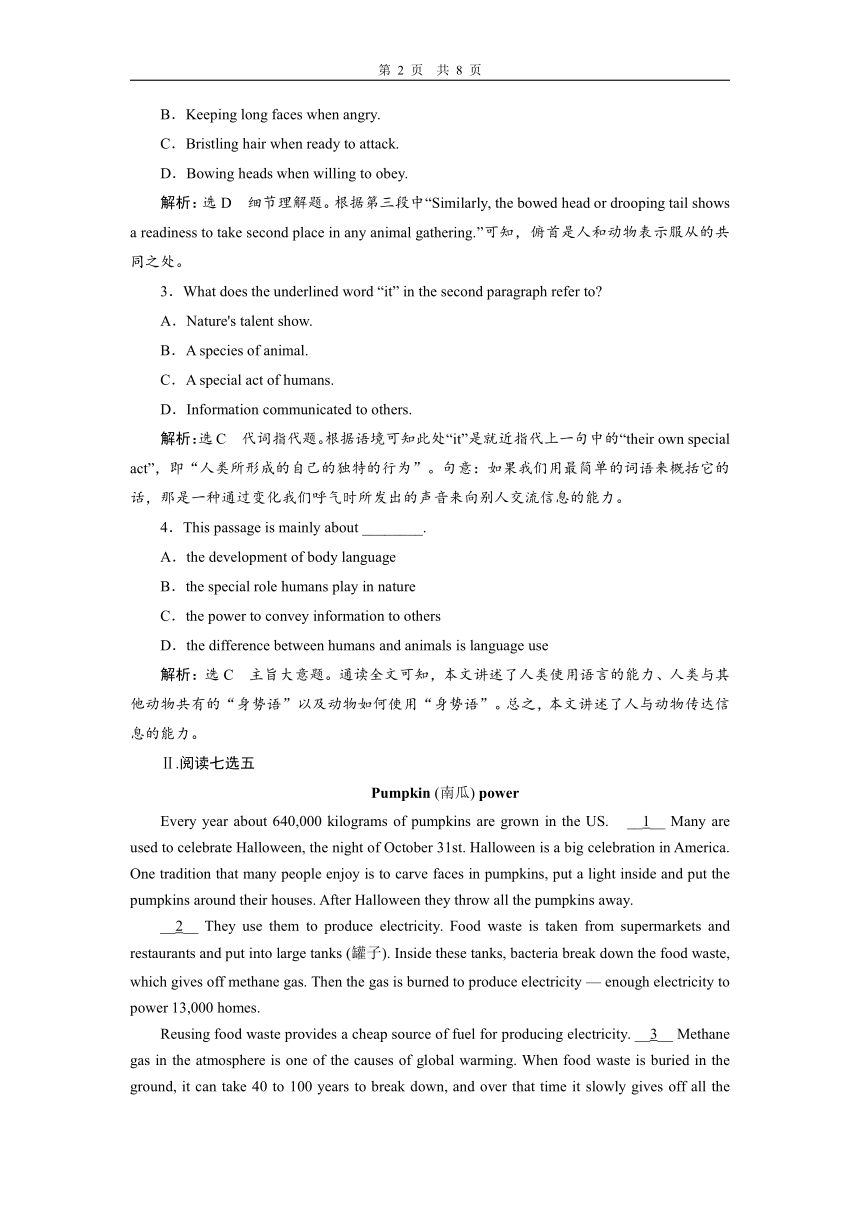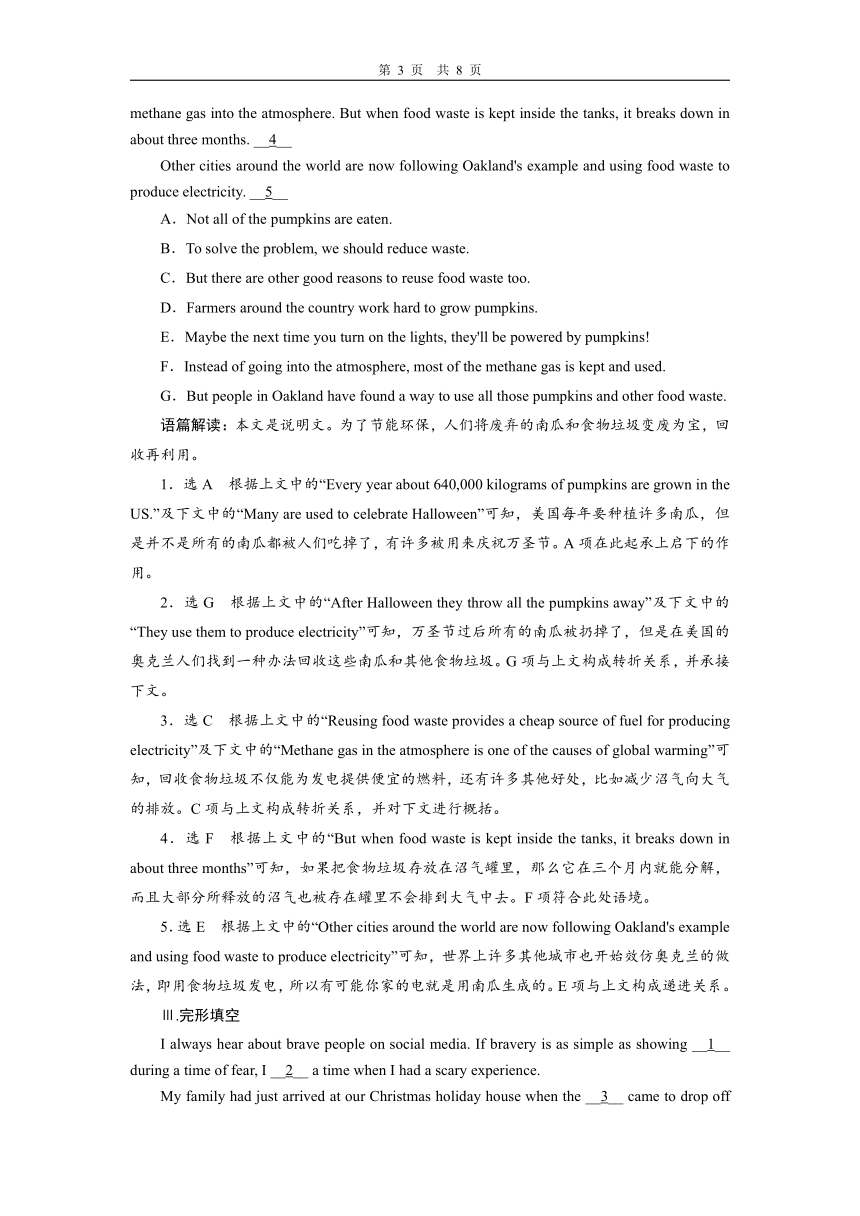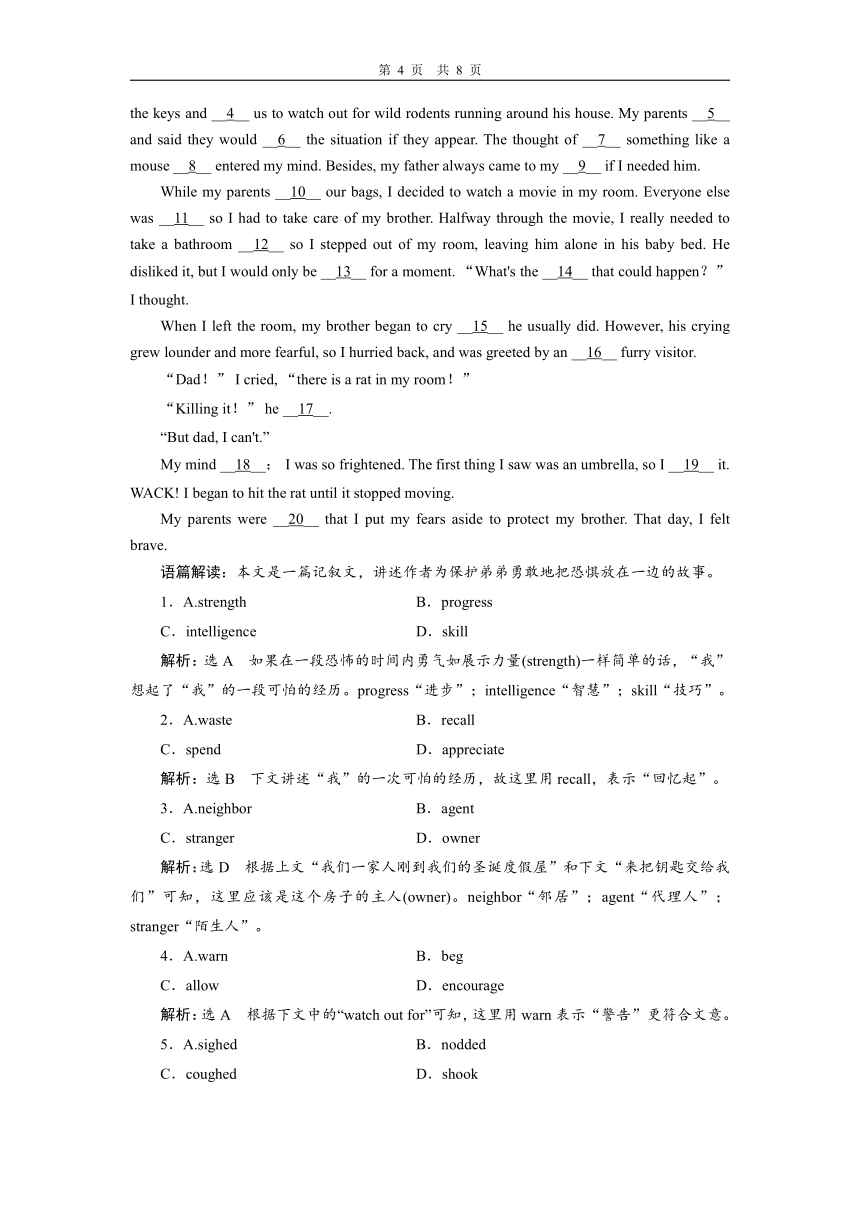人教版(2019)选择性必修 第一册Unit 4 Body Language 单元加餐练(含答案)
文档属性
| 名称 | 人教版(2019)选择性必修 第一册Unit 4 Body Language 单元加餐练(含答案) |

|
|
| 格式 | zip | ||
| 文件大小 | 85.5KB | ||
| 资源类型 | 教案 | ||
| 版本资源 | 人教版(2019) | ||
| 科目 | 英语 | ||
| 更新时间 | 2022-12-26 20:29:06 | ||
图片预览




文档简介
PAGE
第 8 页 共 8 页
Unit 4 单元加餐练
Ⅰ.阅读理解
Every day we experience one of the wonders of the world around us without even realizing it. It is not the amazing complexity of television, nor the impressive technology of transport. The universal wonder we share and experience is our ability to make noises with our mouths, and so transmit ideas and thoughts to each other's minds. This ability comes so naturally that we tend to forget what a miracle (奇迹) it is.
Obviously, the ability to talk is something that marks humans off from animals. Of course, some animals have powers just as amazing. Birds can fly thousands of miles by observing positions of the stars in the sky in relation to the time of day and year. In Nature's talent show, humans are a species of animal that have developed their own special act. If we reduce it to basic terms, it's an ability for communicating information to others by varying sounds we make as we breathe out.
Not that we don't have other powers of communication. Our facial expressions convey our emotions, such as anger, or joy, or disappointment. The way we hold our heads can indicate to others whether we are happy or sad. This is so called “body language”. Bristling (直立的) fur is an unmistakable warning of attack among many animals. Similarly, the bowed head or drooping tail shows a readiness to take second place in any animal gathering.
Such a means of communication is a basic mechanism that animals, including human beings, instinctively acquire and display. Is the ability to speak just another sort of instinct If so, how did human beings acquire this amazing skill Biologists can readily indicate that particular area of our brain where speech mechanisms function, but this doesn't tell us how that part of our bodies originated in our biological history.
语篇解读:本文讲述了人类使用语言的能力、人类与其他动物共有的“身势语”以及动物如何使用“身势语”。
1.According to the passage, the wonder we take for granted is ________.
A.our ability to use language
B.the miracle of technology
C.the amazing power of nature
D.our ability to make noises with mouth
解析:选A 细节理解题。根据第一段的叙述可知,我们每天都在用语言交流我们的思想感情,这可谓是一个奇迹,但是因其自然流露,我们完全忽视了它的功能与作用,想当然地认为就是这个样子。D项有一定干扰性,但叙述不完全。
2.What feature of “body language” mentioned in the passage is common to both humans and animals
A.Lifting heads when sad.
B.Keeping long faces when angry.
C.Bristling hair when ready to attack.
D.Bowing heads when willing to obey.
解析:选D 细节理解题。根据第三段中“Similarly, the bowed head or drooping tail shows a readiness to take second place in any animal gathering.”可知,俯首是人和动物表示服从的共同之处。
3.What does the underlined word “it” in the second paragraph refer to
A.Nature's talent show.
B.A species of animal.
C.A special act of humans.
D.Information communicated to others.
解析:选C 代词指代题。根据语境可知此处“it”是就近指代上一句中的“their own special act”,即“人类所形成的自己的独特的行为”。句意:如果我们用最简单的词语来概括它的话,那是一种通过变化我们呼气时所发出的声音来向别人交流信息的能力。
4.This passage is mainly about ________.
A.the development of body language
B.the special role humans play in nature
C.the power to convey information to others
D.the difference between humans and animals is language use
解析:选C 主旨大意题。通读全文可知,本文讲述了人类使用语言的能力、人类与其他动物共有的“身势语”以及动物如何使用“身势语”。总之,本文讲述了人与动物传达信息的能力。
Ⅱ.阅读七选五
Pumpkin (南瓜) power
Every year about 640,000 kilograms of pumpkins are grown in the US. __1__ Many are used to celebrate Halloween, the night of October 31st. Halloween is a big celebration in America. One tradition that many people enjoy is to carve faces in pumpkins, put a light inside and put the pumpkins around their houses. After Halloween they throw all the pumpkins away.
__2__ They use them to produce electricity. Food waste is taken from supermarkets and restaurants and put into large tanks (罐子). Inside these tanks, bacteria break down the food waste, which gives off methane gas. Then the gas is burned to produce electricity — enough electricity to power 13,000 homes.
Reusing food waste provides a cheap source of fuel for producing electricity. __3__ Methane gas in the atmosphere is one of the causes of global warming. When food waste is buried in the ground, it can take 40 to 100 years to break down, and over that time it slowly gives off all the methane gas into the atmosphere. But when food waste is kept inside the tanks, it breaks down in about three months. __4__
Other cities around the world are now following Oakland's example and using food waste to produce electricity. __5__
A.Not all of the pumpkins are eaten.
B.To solve the problem, we should reduce waste.
C.But there are other good reasons to reuse food waste too.
D.Farmers around the country work hard to grow pumpkins.
E.Maybe the next time you turn on the lights, they'll be powered by pumpkins!
F.Instead of going into the atmosphere, most of the methane gas is kept and used.
G.But people in Oakland have found a way to use all those pumpkins and other food waste.
语篇解读:本文是说明文。为了节能环保,人们将废弃的南瓜和食物垃圾变废为宝,回收再利用。
1.选A 根据上文中的“Every year about 640,000 kilograms of pumpkins are grown in the US.”及下文中的“Many are used to celebrate Halloween”可知,美国每年要种植许多南瓜,但是并不是所有的南瓜都被人们吃掉了,有许多被用来庆祝万圣节。A项在此起承上启下的作用。
2.选G 根据上文中的“After Halloween they throw all the pumpkins away”及下文中的“They use them to produce electricity”可知,万圣节过后所有的南瓜被扔掉了,但是在美国的奥克兰人们找到一种办法回收这些南瓜和其他食物垃圾。G项与上文构成转折关系,并承接下文。
3.选C 根据上文中的“Reusing food waste provides a cheap source of fuel for producing electricity”及下文中的“Methane gas in the atmosphere is one of the causes of global warming”可知,回收食物垃圾不仅能为发电提供便宜的燃料,还有许多其他好处,比如减少沼气向大气的排放。C项与上文构成转折关系,并对下文进行概括。
4.选F 根据上文中的“But when food waste is kept inside the tanks, it breaks down in about three months”可知,如果把食物垃圾存放在沼气罐里,那么它在三个月内就能分解,而且大部分所释放的沼气也被存在罐里不会排到大气中去。F项符合此处语境。
5.选E 根据上文中的“Other cities around the world are now following Oakland's example and using food waste to produce electricity”可知,世界上许多其他城市也开始效仿奥克兰的做法,即用食物垃圾发电,所以有可能你家的电就是用南瓜生成的。E项与上文构成递进关系。
Ⅲ.完形填空
I always hear about brave people on social media. If bravery is as simple as showing __1__ during a time of fear, I __2__ a time when I had a scary experience.
My family had just arrived at our Christmas holiday house when the __3__ came to drop off the keys and __4__ us to watch out for wild rodents running around his house. My parents __5__ and said they would __6__ the situation if they appear. The thought of __7__ something like a mouse __8__ entered my mind. Besides, my father always came to my __9__ if I needed him.
While my parents __10__ our bags, I decided to watch a movie in my room. Everyone else was __11__ so I had to take care of my brother. Halfway through the movie, I really needed to take a bathroom __12__ so I stepped out of my room, leaving him alone in his baby bed. He disliked it, but I would only be __13__ for a moment. “What's the __14__ that could happen?” I thought.
When I left the room, my brother began to cry __15__ he usually did. However, his crying grew lounder and more fearful, so I hurried back, and was greeted by an __16__ furry visitor.
“Dad!” I cried, “there is a rat in my room!”
“Killing it!” he __17__.
“But dad, I can't.”
My mind __18__; I was so frightened. The first thing I saw was an umbrella, so I __19__ it. WACK! I began to hit the rat until it stopped moving.
My parents were __20__ that I put my fears aside to protect my brother. That day, I felt brave.
语篇解读:本文是一篇记叙文,讲述作者为保护弟弟勇敢地把恐惧放在一边的故事。
1.A.strength B.progress
C.intelligence D.skill
解析:选A 如果在一段恐怖的时间内勇气如展示力量(strength)一样简单的话,“我”想起了“我”的一段可怕的经历。progress“进步”;intelligence“智慧”;skill“技巧”。
2.A.waste B.recall
C.spend D.appreciate
解析:选B 下文讲述“我”的一次可怕的经历,故这里用recall,表示“回忆起”。
3.A.neighbor B.agent
C.stranger D.owner
解析:选D 根据上文“我们一家人刚到我们的圣诞度假屋”和下文“来把钥匙交给我们”可知,这里应该是这个房子的主人(owner)。neighbor“邻居”;agent“代理人”;stranger“陌生人”。
4.A.warn B.beg
C.allow D.encourage
解析:选A 根据下文中的“watch out for”可知,这里用warn表示“警告”更符合文意。
5.A.sighed B.nodded
C.coughed D.shook
解析:选B 根据该空后的“并且说如果它们出现了,他们会处理(handle)这种情况”可知,“我”的父母点头表示理解,故用nodded。sigh“叹息”;cough“咳嗽”;shake“摇动”。
6.A.ignore B.handle
C.overcome D.challenge
解析:选B 参见上题解析。ignore“忽视”;overcome“克服”;challenge“向……挑战”。
7.A.observing B.playing
C.teasing D.killing
解析:选D 根据下文中的“Killing it”可知,这里用killing照应下文。observe“观察”;play“玩”;tease“逗弄”。
8.A.almost B.gradually
C.never D.suddenly
解析:选D 这里用suddenly强调听到房东和父母的对话后,“我”突然产生的想法。almost“几乎”;gradually“渐渐地”;never“永不”。
9.A.life B.hand
C.mind D.aid
解析:选D 根据下文当“我”发现大老鼠出现在房间时,“我”立即向爸爸求助可以推知,此处表示“而且,如果我需要我父亲(帮助),他总会来帮忙”。come to one's aid表示“帮助某人”,符合语境。come to one's mind“想起”。
10.A.unpacked B.unfolded
C.unlocked D.uncovered
解析:选A 根据上文可知,我们一家人刚住进这个房子,且根据常识,进去之后,要把包里的东西整理一下,故这里应用unpacked“打开(盒子、包、手提箱等)取出”。unfold“展开”;unlock“开锁”;uncover“揭开……的盖子”。
11.A.occupied B.excited
C.hurried D.frightened
解析:选A 根据该空后的“因此我不得不照看我弟弟”可知,此时其他人都在忙碌着。excited“兴奋的”;hurried“匆忙的”;frightened“害怕的”。occupied“忙于……的,从事……的”,符合语境。
12.A.ride B.walk
C.break D.chance
解析:选C 根据下文中的“so I stepped out of my room”可知,电影看到一半的时候,“我”需要上厕所。break“间歇,暂时休息”,符合语境。take a break“休息一会儿”为固定搭配。ride“旅程”;walk“步行”;chance“机会”。
13.A.available B.brave
C.lost D.gone
解析:选D 根据上文可知,此处表示“我只是离开一会儿”。gone表示“暂时不在的”,符合语境。available“可得到的”;brave“勇敢的”;lost“丢失的,迷路的”。
14.A.least B.worst
C.most D.best
解析:选B 根据下文当“我”离开房间,“我”的弟弟就开始哭,并且越哭越大声可以判断,可能发生什么不好的事情了,四个选项中只有worst符合语境。
15.A.when B.if
C.as D.until
解析:选C 根据上下文和常识可知,此处表示“在我离开房间时,我的弟弟如往常一样开始哭起来”。as表示“如同”,引导方式状语从句,其他三个选项不能引导方式状语从句。
16.A.unreasonable B.unexpected
C.unconscious D.unqualified
解析:选B 根据上下文可知, 一个出人意料的毛茸茸的来访者突然出现,故用unexpected“出人意料的”。unreasonable“不合理的”;unconscious“无意识的”;unqualified“不合格的,无资格的”。
17.A.complained B.informed
C.yelled D.signed
解析:选C 根据上文可知,“我”父亲没有和“我”在一个房间,且正在忙碌,又根据祈使句“Killing it”可知,“我”的父亲应该是大声呼喊(yelled)。complain“抱怨”;inform“告知”;sign“示意”。
18.A.froze B.broke
C.wandered D.changed
解析:选A 根据下文中的“I was so frightened”可推知,“我”当时不知所措,故“我”的头脑因害怕而突然停止(froze)了。break“打破”;wander“开小差”;change“改变”。
19.A.kicked B.handed
C.seized D.threw
解析:选C 根据上文中的“我看见的第一件东西是伞”和下文中的“我开始打那只大老鼠”可知,此处表示“我抓起(seized)那把雨伞”。kick“踢”;hand“给”;throw“扔”。
20.A.afraid B.awkward
C.overjoyed D.proud
解析:选D 根据上下文内容可知,因为“我”无视恐惧,把大老鼠打死,保护了“我”的弟弟,所以“我”的父母为“我”感到自豪(proud)。afraid“害怕的”;awkward“令人尴尬的”;overjoyed“狂喜的”,用在这里太过夸张。
Ⅳ.语法填空
Bike to Work Day is started by the League of American Bicyclists in 1956 with __1__ aim of promoting the bicycle as a serious choice of getting to and from work. It is __2__ (annual) held across North America on the third Friday of May. In today's world __3__ global warming is a serious issue, the bicycle is a perfect way of reducing our carbon footprint. Cycling to work is a healthy alternative __4__ driving or taking public transport. It can not only save you money but also enable you to be more __5__ (create) once you get to work, thus improving your performance.
Bicycles are the most common form of transport in the world and there are about two billion in use worldwide, __6__ (make) the bicycle the most popular invention ever. When we think of some countries, like the Netherlands, we imagine __7__ (hundred) of people cycling everywhere. Even in high tech Japan, it is impossible not __8__ (see) businessmen, farmers, mothers or workers in the streets on their bikes. Bicycles __9__ (invent) in the 19th century and haven't changed much since. Today, we use bicycles for pleasure, fitness, Olympic competitions, mail __10__ (deliver) and lots more. Without the bicycle, much of the world might stop working!
语篇解读:本文是一篇说明文,介绍了Bike to Work Day的由来以及骑自行车的好处等。
1.the 考查冠词。此处特指创立Bike to Work Day的宗旨,故填the。with the aim of doing sth.“以做某事为目标,旨在做某事”。
2.annually 考查副词。应用副词修饰动词held。annually“一年一次地”。
3.where 考查定语从句。分析句子结构可知,空处在此引导定语从句,且在从句中作地点状语,先行词为today's world,故填where。
4.to 考查介词。alternative在此作名词,意为“可供选择的事物”,常与介词to搭配使用。
5.creative 考查形容词。根据空前的“to be more”可知,此处应用形容词。creative“有创造力的”。
6.making 考查非谓语动词。自行车是世界上最常见的交通方式,全世界在使用中的自行车约有二十亿辆,这使得自行车成为有史以来最受欢迎的发明。make与其逻辑主语之间是主谓关系,故应用现在分词作状语。
7.hundreds 考查名词复数。hundreds of表示“数以百计的,很多的”,是固定用法。
8.to see 考查非谓语动词。此处考查的是“it is+adj.+to do”句型,其中it是形式主语,真正的主语是后面的不定式。
9.were invented 考查动词的时态和语态。自行车是在19世纪被发明的。根据时间状语“in the 19th century”可知,此处描述的是发生在过去的动作,应用一般过去时;又因Bicycles和invent之间是被动关系,应用被动语态。故填were invented。
10.delivery 考查名词。分析句子结构可知,mail与空处构成名词词组,在句中作介词for的宾语,故应填名词delivery“传送,递送”。
Ⅴ.应用文写作
假设你叫李明,你的外国朋友Andrew来上海旅游,回国后因天气和旅途劳累等原因病倒了,请你给他写一封慰问信。词数80左右。
参考范文:
Dear Andrew,
I was very sorry to hear that you have been ill since you returned to your home from China, and that your illness was caused by the bad weather in Shanghai last week.
We had a wonderful time while you were here, forgetting that the weather in Shanghai is very different from that in New York. You must also have been very tired after travelling such a long distance in such a short time. So I suggest you get some rest, and if necessary, go to see a doctor. Don't worry too much about your studies. You'll catch up with others soon once you recover.
I am looking forward to your early recovery.
Sincerely yours,
Li Ming
第 8 页 共 8 页
Unit 4 单元加餐练
Ⅰ.阅读理解
Every day we experience one of the wonders of the world around us without even realizing it. It is not the amazing complexity of television, nor the impressive technology of transport. The universal wonder we share and experience is our ability to make noises with our mouths, and so transmit ideas and thoughts to each other's minds. This ability comes so naturally that we tend to forget what a miracle (奇迹) it is.
Obviously, the ability to talk is something that marks humans off from animals. Of course, some animals have powers just as amazing. Birds can fly thousands of miles by observing positions of the stars in the sky in relation to the time of day and year. In Nature's talent show, humans are a species of animal that have developed their own special act. If we reduce it to basic terms, it's an ability for communicating information to others by varying sounds we make as we breathe out.
Not that we don't have other powers of communication. Our facial expressions convey our emotions, such as anger, or joy, or disappointment. The way we hold our heads can indicate to others whether we are happy or sad. This is so called “body language”. Bristling (直立的) fur is an unmistakable warning of attack among many animals. Similarly, the bowed head or drooping tail shows a readiness to take second place in any animal gathering.
Such a means of communication is a basic mechanism that animals, including human beings, instinctively acquire and display. Is the ability to speak just another sort of instinct If so, how did human beings acquire this amazing skill Biologists can readily indicate that particular area of our brain where speech mechanisms function, but this doesn't tell us how that part of our bodies originated in our biological history.
语篇解读:本文讲述了人类使用语言的能力、人类与其他动物共有的“身势语”以及动物如何使用“身势语”。
1.According to the passage, the wonder we take for granted is ________.
A.our ability to use language
B.the miracle of technology
C.the amazing power of nature
D.our ability to make noises with mouth
解析:选A 细节理解题。根据第一段的叙述可知,我们每天都在用语言交流我们的思想感情,这可谓是一个奇迹,但是因其自然流露,我们完全忽视了它的功能与作用,想当然地认为就是这个样子。D项有一定干扰性,但叙述不完全。
2.What feature of “body language” mentioned in the passage is common to both humans and animals
A.Lifting heads when sad.
B.Keeping long faces when angry.
C.Bristling hair when ready to attack.
D.Bowing heads when willing to obey.
解析:选D 细节理解题。根据第三段中“Similarly, the bowed head or drooping tail shows a readiness to take second place in any animal gathering.”可知,俯首是人和动物表示服从的共同之处。
3.What does the underlined word “it” in the second paragraph refer to
A.Nature's talent show.
B.A species of animal.
C.A special act of humans.
D.Information communicated to others.
解析:选C 代词指代题。根据语境可知此处“it”是就近指代上一句中的“their own special act”,即“人类所形成的自己的独特的行为”。句意:如果我们用最简单的词语来概括它的话,那是一种通过变化我们呼气时所发出的声音来向别人交流信息的能力。
4.This passage is mainly about ________.
A.the development of body language
B.the special role humans play in nature
C.the power to convey information to others
D.the difference between humans and animals is language use
解析:选C 主旨大意题。通读全文可知,本文讲述了人类使用语言的能力、人类与其他动物共有的“身势语”以及动物如何使用“身势语”。总之,本文讲述了人与动物传达信息的能力。
Ⅱ.阅读七选五
Pumpkin (南瓜) power
Every year about 640,000 kilograms of pumpkins are grown in the US. __1__ Many are used to celebrate Halloween, the night of October 31st. Halloween is a big celebration in America. One tradition that many people enjoy is to carve faces in pumpkins, put a light inside and put the pumpkins around their houses. After Halloween they throw all the pumpkins away.
__2__ They use them to produce electricity. Food waste is taken from supermarkets and restaurants and put into large tanks (罐子). Inside these tanks, bacteria break down the food waste, which gives off methane gas. Then the gas is burned to produce electricity — enough electricity to power 13,000 homes.
Reusing food waste provides a cheap source of fuel for producing electricity. __3__ Methane gas in the atmosphere is one of the causes of global warming. When food waste is buried in the ground, it can take 40 to 100 years to break down, and over that time it slowly gives off all the methane gas into the atmosphere. But when food waste is kept inside the tanks, it breaks down in about three months. __4__
Other cities around the world are now following Oakland's example and using food waste to produce electricity. __5__
A.Not all of the pumpkins are eaten.
B.To solve the problem, we should reduce waste.
C.But there are other good reasons to reuse food waste too.
D.Farmers around the country work hard to grow pumpkins.
E.Maybe the next time you turn on the lights, they'll be powered by pumpkins!
F.Instead of going into the atmosphere, most of the methane gas is kept and used.
G.But people in Oakland have found a way to use all those pumpkins and other food waste.
语篇解读:本文是说明文。为了节能环保,人们将废弃的南瓜和食物垃圾变废为宝,回收再利用。
1.选A 根据上文中的“Every year about 640,000 kilograms of pumpkins are grown in the US.”及下文中的“Many are used to celebrate Halloween”可知,美国每年要种植许多南瓜,但是并不是所有的南瓜都被人们吃掉了,有许多被用来庆祝万圣节。A项在此起承上启下的作用。
2.选G 根据上文中的“After Halloween they throw all the pumpkins away”及下文中的“They use them to produce electricity”可知,万圣节过后所有的南瓜被扔掉了,但是在美国的奥克兰人们找到一种办法回收这些南瓜和其他食物垃圾。G项与上文构成转折关系,并承接下文。
3.选C 根据上文中的“Reusing food waste provides a cheap source of fuel for producing electricity”及下文中的“Methane gas in the atmosphere is one of the causes of global warming”可知,回收食物垃圾不仅能为发电提供便宜的燃料,还有许多其他好处,比如减少沼气向大气的排放。C项与上文构成转折关系,并对下文进行概括。
4.选F 根据上文中的“But when food waste is kept inside the tanks, it breaks down in about three months”可知,如果把食物垃圾存放在沼气罐里,那么它在三个月内就能分解,而且大部分所释放的沼气也被存在罐里不会排到大气中去。F项符合此处语境。
5.选E 根据上文中的“Other cities around the world are now following Oakland's example and using food waste to produce electricity”可知,世界上许多其他城市也开始效仿奥克兰的做法,即用食物垃圾发电,所以有可能你家的电就是用南瓜生成的。E项与上文构成递进关系。
Ⅲ.完形填空
I always hear about brave people on social media. If bravery is as simple as showing __1__ during a time of fear, I __2__ a time when I had a scary experience.
My family had just arrived at our Christmas holiday house when the __3__ came to drop off the keys and __4__ us to watch out for wild rodents running around his house. My parents __5__ and said they would __6__ the situation if they appear. The thought of __7__ something like a mouse __8__ entered my mind. Besides, my father always came to my __9__ if I needed him.
While my parents __10__ our bags, I decided to watch a movie in my room. Everyone else was __11__ so I had to take care of my brother. Halfway through the movie, I really needed to take a bathroom __12__ so I stepped out of my room, leaving him alone in his baby bed. He disliked it, but I would only be __13__ for a moment. “What's the __14__ that could happen?” I thought.
When I left the room, my brother began to cry __15__ he usually did. However, his crying grew lounder and more fearful, so I hurried back, and was greeted by an __16__ furry visitor.
“Dad!” I cried, “there is a rat in my room!”
“Killing it!” he __17__.
“But dad, I can't.”
My mind __18__; I was so frightened. The first thing I saw was an umbrella, so I __19__ it. WACK! I began to hit the rat until it stopped moving.
My parents were __20__ that I put my fears aside to protect my brother. That day, I felt brave.
语篇解读:本文是一篇记叙文,讲述作者为保护弟弟勇敢地把恐惧放在一边的故事。
1.A.strength B.progress
C.intelligence D.skill
解析:选A 如果在一段恐怖的时间内勇气如展示力量(strength)一样简单的话,“我”想起了“我”的一段可怕的经历。progress“进步”;intelligence“智慧”;skill“技巧”。
2.A.waste B.recall
C.spend D.appreciate
解析:选B 下文讲述“我”的一次可怕的经历,故这里用recall,表示“回忆起”。
3.A.neighbor B.agent
C.stranger D.owner
解析:选D 根据上文“我们一家人刚到我们的圣诞度假屋”和下文“来把钥匙交给我们”可知,这里应该是这个房子的主人(owner)。neighbor“邻居”;agent“代理人”;stranger“陌生人”。
4.A.warn B.beg
C.allow D.encourage
解析:选A 根据下文中的“watch out for”可知,这里用warn表示“警告”更符合文意。
5.A.sighed B.nodded
C.coughed D.shook
解析:选B 根据该空后的“并且说如果它们出现了,他们会处理(handle)这种情况”可知,“我”的父母点头表示理解,故用nodded。sigh“叹息”;cough“咳嗽”;shake“摇动”。
6.A.ignore B.handle
C.overcome D.challenge
解析:选B 参见上题解析。ignore“忽视”;overcome“克服”;challenge“向……挑战”。
7.A.observing B.playing
C.teasing D.killing
解析:选D 根据下文中的“Killing it”可知,这里用killing照应下文。observe“观察”;play“玩”;tease“逗弄”。
8.A.almost B.gradually
C.never D.suddenly
解析:选D 这里用suddenly强调听到房东和父母的对话后,“我”突然产生的想法。almost“几乎”;gradually“渐渐地”;never“永不”。
9.A.life B.hand
C.mind D.aid
解析:选D 根据下文当“我”发现大老鼠出现在房间时,“我”立即向爸爸求助可以推知,此处表示“而且,如果我需要我父亲(帮助),他总会来帮忙”。come to one's aid表示“帮助某人”,符合语境。come to one's mind“想起”。
10.A.unpacked B.unfolded
C.unlocked D.uncovered
解析:选A 根据上文可知,我们一家人刚住进这个房子,且根据常识,进去之后,要把包里的东西整理一下,故这里应用unpacked“打开(盒子、包、手提箱等)取出”。unfold“展开”;unlock“开锁”;uncover“揭开……的盖子”。
11.A.occupied B.excited
C.hurried D.frightened
解析:选A 根据该空后的“因此我不得不照看我弟弟”可知,此时其他人都在忙碌着。excited“兴奋的”;hurried“匆忙的”;frightened“害怕的”。occupied“忙于……的,从事……的”,符合语境。
12.A.ride B.walk
C.break D.chance
解析:选C 根据下文中的“so I stepped out of my room”可知,电影看到一半的时候,“我”需要上厕所。break“间歇,暂时休息”,符合语境。take a break“休息一会儿”为固定搭配。ride“旅程”;walk“步行”;chance“机会”。
13.A.available B.brave
C.lost D.gone
解析:选D 根据上文可知,此处表示“我只是离开一会儿”。gone表示“暂时不在的”,符合语境。available“可得到的”;brave“勇敢的”;lost“丢失的,迷路的”。
14.A.least B.worst
C.most D.best
解析:选B 根据下文当“我”离开房间,“我”的弟弟就开始哭,并且越哭越大声可以判断,可能发生什么不好的事情了,四个选项中只有worst符合语境。
15.A.when B.if
C.as D.until
解析:选C 根据上下文和常识可知,此处表示“在我离开房间时,我的弟弟如往常一样开始哭起来”。as表示“如同”,引导方式状语从句,其他三个选项不能引导方式状语从句。
16.A.unreasonable B.unexpected
C.unconscious D.unqualified
解析:选B 根据上下文可知, 一个出人意料的毛茸茸的来访者突然出现,故用unexpected“出人意料的”。unreasonable“不合理的”;unconscious“无意识的”;unqualified“不合格的,无资格的”。
17.A.complained B.informed
C.yelled D.signed
解析:选C 根据上文可知,“我”父亲没有和“我”在一个房间,且正在忙碌,又根据祈使句“Killing it”可知,“我”的父亲应该是大声呼喊(yelled)。complain“抱怨”;inform“告知”;sign“示意”。
18.A.froze B.broke
C.wandered D.changed
解析:选A 根据下文中的“I was so frightened”可推知,“我”当时不知所措,故“我”的头脑因害怕而突然停止(froze)了。break“打破”;wander“开小差”;change“改变”。
19.A.kicked B.handed
C.seized D.threw
解析:选C 根据上文中的“我看见的第一件东西是伞”和下文中的“我开始打那只大老鼠”可知,此处表示“我抓起(seized)那把雨伞”。kick“踢”;hand“给”;throw“扔”。
20.A.afraid B.awkward
C.overjoyed D.proud
解析:选D 根据上下文内容可知,因为“我”无视恐惧,把大老鼠打死,保护了“我”的弟弟,所以“我”的父母为“我”感到自豪(proud)。afraid“害怕的”;awkward“令人尴尬的”;overjoyed“狂喜的”,用在这里太过夸张。
Ⅳ.语法填空
Bike to Work Day is started by the League of American Bicyclists in 1956 with __1__ aim of promoting the bicycle as a serious choice of getting to and from work. It is __2__ (annual) held across North America on the third Friday of May. In today's world __3__ global warming is a serious issue, the bicycle is a perfect way of reducing our carbon footprint. Cycling to work is a healthy alternative __4__ driving or taking public transport. It can not only save you money but also enable you to be more __5__ (create) once you get to work, thus improving your performance.
Bicycles are the most common form of transport in the world and there are about two billion in use worldwide, __6__ (make) the bicycle the most popular invention ever. When we think of some countries, like the Netherlands, we imagine __7__ (hundred) of people cycling everywhere. Even in high tech Japan, it is impossible not __8__ (see) businessmen, farmers, mothers or workers in the streets on their bikes. Bicycles __9__ (invent) in the 19th century and haven't changed much since. Today, we use bicycles for pleasure, fitness, Olympic competitions, mail __10__ (deliver) and lots more. Without the bicycle, much of the world might stop working!
语篇解读:本文是一篇说明文,介绍了Bike to Work Day的由来以及骑自行车的好处等。
1.the 考查冠词。此处特指创立Bike to Work Day的宗旨,故填the。with the aim of doing sth.“以做某事为目标,旨在做某事”。
2.annually 考查副词。应用副词修饰动词held。annually“一年一次地”。
3.where 考查定语从句。分析句子结构可知,空处在此引导定语从句,且在从句中作地点状语,先行词为today's world,故填where。
4.to 考查介词。alternative在此作名词,意为“可供选择的事物”,常与介词to搭配使用。
5.creative 考查形容词。根据空前的“to be more”可知,此处应用形容词。creative“有创造力的”。
6.making 考查非谓语动词。自行车是世界上最常见的交通方式,全世界在使用中的自行车约有二十亿辆,这使得自行车成为有史以来最受欢迎的发明。make与其逻辑主语之间是主谓关系,故应用现在分词作状语。
7.hundreds 考查名词复数。hundreds of表示“数以百计的,很多的”,是固定用法。
8.to see 考查非谓语动词。此处考查的是“it is+adj.+to do”句型,其中it是形式主语,真正的主语是后面的不定式。
9.were invented 考查动词的时态和语态。自行车是在19世纪被发明的。根据时间状语“in the 19th century”可知,此处描述的是发生在过去的动作,应用一般过去时;又因Bicycles和invent之间是被动关系,应用被动语态。故填were invented。
10.delivery 考查名词。分析句子结构可知,mail与空处构成名词词组,在句中作介词for的宾语,故应填名词delivery“传送,递送”。
Ⅴ.应用文写作
假设你叫李明,你的外国朋友Andrew来上海旅游,回国后因天气和旅途劳累等原因病倒了,请你给他写一封慰问信。词数80左右。
参考范文:
Dear Andrew,
I was very sorry to hear that you have been ill since you returned to your home from China, and that your illness was caused by the bad weather in Shanghai last week.
We had a wonderful time while you were here, forgetting that the weather in Shanghai is very different from that in New York. You must also have been very tired after travelling such a long distance in such a short time. So I suggest you get some rest, and if necessary, go to see a doctor. Don't worry too much about your studies. You'll catch up with others soon once you recover.
I am looking forward to your early recovery.
Sincerely yours,
Li Ming
